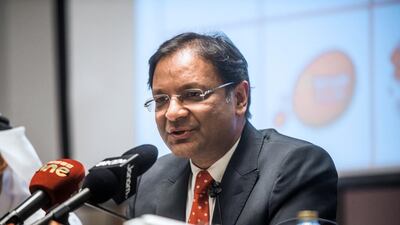India’s SpiceJet plans to nearly double its number of flights between Dubai and India to 15 a day as the low-cost carrier negotiates an order for more than 150 new planes.
“Dubai is an incredibly important market for SpiceJet,” said Ajay Singh, the chairman. “It is our No 1 international market. Today, we fly 100,000 passengers a month to and from Dubai, and we would love to expand that presence in the coming quarters.”
He said the additional flights would be a mix of increased frequency on existing routes and new destinations, with Hyderabad and Jaipur likely to be next.
SpiceJet is also set to launch a new tour operator business offering packages to Dubai, as well as services such as visa processing and SIM card sales.
But it is the proposed order of more than 150 new jets that represents the clearest signal yet of the turnaround in fortunes for SpiceJet, which was on the verge of collapse in December last year when it suspended all operations and told staff not to return for duty.
Mr Singh, who was one of the airline’s founders, had not been involved with the business since 2010 but returned as a result of the crisis, buying a 58.46 per cent stake from former shareholders Kalanithi Maran and KAL Airways.
Since his return, the company has enjoyed three profitable quarters and has cut its debt by 55 per cent to 10 billion rupees (Dh550 million), from 22bn rupees. In the three months to September 30, it posted a quarterly profit of 237.7m rupees and Mr Singh said that occupancy levels have bounced back strongly, with the airline achieving a load factor of 92 per cent in recent months.
“In the last few days, the occupancy has been in excess of 95 per cent. This is no mean task for an airline that just in October increased its capacity by 17 per cent. From 250 flights a day, we are now doing 298.”
As a result, he argued that its plan to place major plane orders – either for Airbus A320neo or Boeing 737 Max units for single-aisle planes, and with Bombardier, ATR or Embraer for small planes for use on intra-country routes – can be funded from its own cash flow.
“Should we need to raise some money, which looks unlikely at this time, there are enough credit lines available to SpiceJet not utilised at this time. There is no intention of diluting any equity at this point. Even though SpiceJet is the best-performing aviation stock in the word this year, we still feel that, relative to other players in the Indian market, we are undervalued.”
Since the start of 2015, SpiceJet’s shares have soared by more than 260 per cent and its improved performance has led to approaches from some Gulf airlines about a potential tie-up, Mr Singh said.
“There has been interest in buying equity into SpiceJet, but I feel that this is not the right time to be diluting equity. In terms of other arrangements, we will continue to explore them.”
India’s aviation market has experienced a boom in the past decade, thanks in part to the growth of low-cost carriers.
According to the India Brand Equity Foundation, passenger traffic has increased by about 12.5 per cent in the year to November. India’s aviation market is the ninth-biggest in the world, with a value of $16bn a year.
mfahy@thenational.ae
Follow The National's Business section on Twitter


